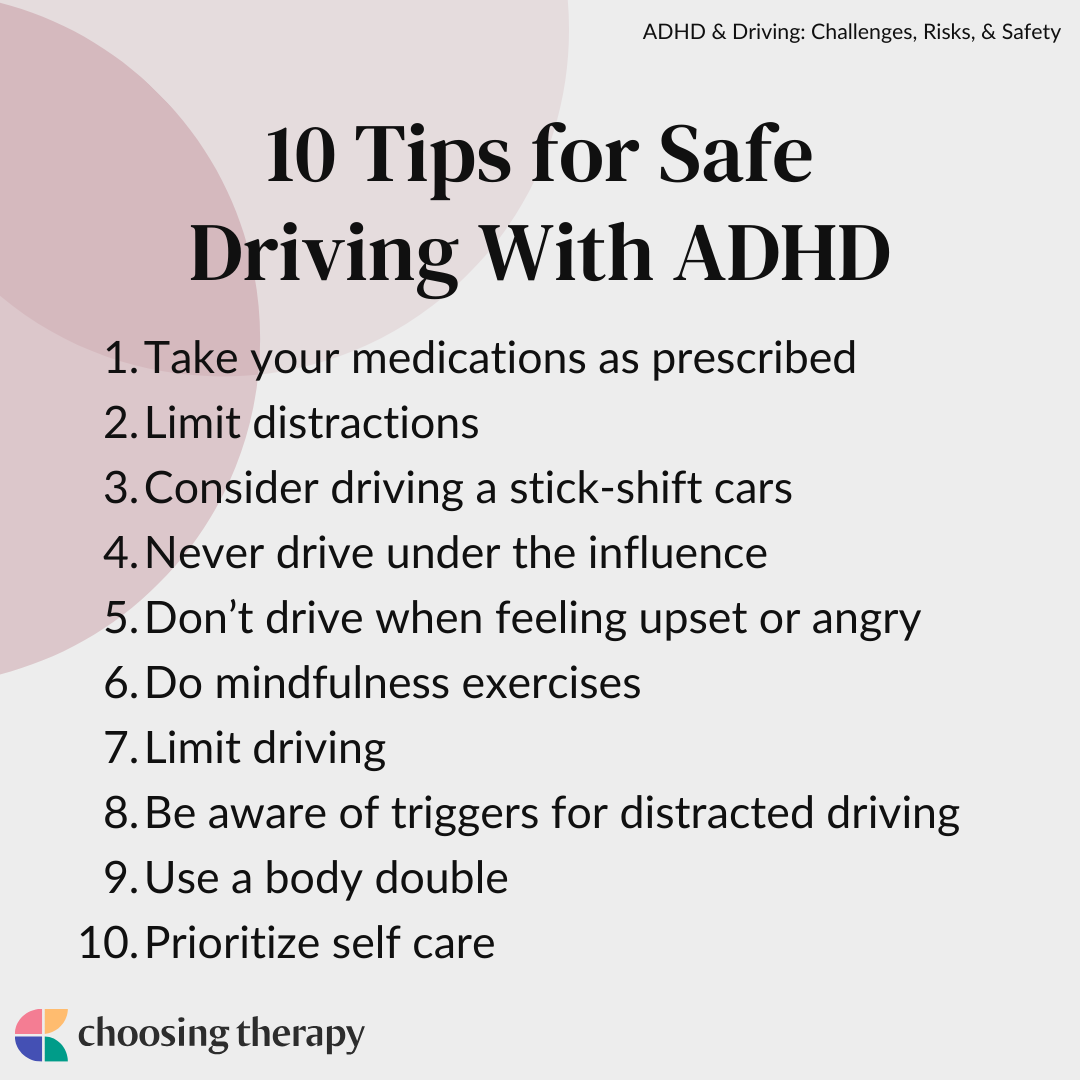Research On ADHD And Driving: Enhancing Safety On The Road

Table of Contents
The Impact of ADHD on Driving Performance
ADHD driving impairments are a serious concern. Research consistently demonstrates a link between ADHD and increased risk on the road. This connection stems from several key factors affecting driving performance:
-
Slower reaction times: Studies show that individuals with ADHD often have significantly longer reaction times than neurotypical drivers. This delay in responding to unexpected events, such as sudden braking or a pedestrian stepping into the road, increases the risk of accidents. This slower reaction time is a significant contributor to ADHD driving accidents.
-
Increased risk-taking behaviors: Impulsivity, a hallmark symptom of ADHD, translates to increased risk-taking behaviors behind the wheel. This might include speeding, unsafe lane changes, tailgating, or ignoring traffic signals. These actions significantly contribute to higher rates of traffic violations and impaired driving instances.
-
Difficulty with sustained attention: Maintaining focus on the road for extended periods is a common challenge for those with ADHD. Lapses in attention can lead to missed turns, failure to observe traffic laws, and a generally decreased awareness of the driving environment. This inattention is a primary factor contributing to ADHD driving errors.
-
Problems with executive functions: Executive functions, such as planning, organizing, and working memory, are often affected by ADHD. This can impact route planning, navigation, and the ability to efficiently manage multiple tasks while driving. These difficulties can lead to increased frustration and further impair driving safety.
-
Higher rates of traffic violations and accidents: A substantial body of research indicates a correlation between ADHD and a higher incidence of traffic accidents and driving violations. This underscores the importance of understanding and addressing the unique driving challenges presented by ADHD.
Specific Driving Challenges Faced by Individuals with ADHD
Beyond general driving impairments, individuals with ADHD face specific challenges that exacerbate the risks associated with driving:
-
Distractibility: Drivers with ADHD are often highly susceptible to distractions. External stimuli, like billboards, conversations, or even thoughts unrelated to driving, can easily divert their attention, leading to dangerous lapses in concentration.
-
Multitasking difficulties: The ability to multitask effectively while driving is crucial for safety. However, individuals with ADHD often struggle with multitasking, making simultaneous actions like changing lanes while talking on a hands-free device extremely challenging and potentially hazardous.
-
Impaired spatial awareness: Accurate judgment of distances, speeds, and the positioning of other vehicles is essential for safe driving. Difficulties with spatial awareness, a common challenge for those with ADHD, increase the likelihood of collisions and near-misses.
-
Medication side effects: While ADHD medication can significantly improve focus and attention, some medications can induce side effects, such as drowsiness or dizziness. These side effects can negatively impact driving ability and should be carefully monitored in consultation with a physician. Driving with ADHD medication requires careful consideration of potential side effects and their impact on driving safety.
Strategies for Safer Driving with ADHD
Improving driving safety for individuals with ADHD involves a multifaceted approach incorporating various strategies:
-
Medication management: Working closely with a doctor to optimize medication dosage and manage any side effects is crucial. This collaboration ensures that medication benefits are maximized while minimizing any potential negative impact on driving.
-
Driving practice and training: Professional driving instruction tailored to address ADHD-specific challenges can significantly improve driving skills and build confidence. This specialized training focuses on developing compensatory strategies for areas of difficulty.
-
Mindfulness and cognitive behavioral therapy (CBT): Techniques like mindfulness and CBT can help improve focus, impulse control, and stress management, all of which are beneficial for safer driving. These therapies aim to address the underlying cognitive challenges contributing to unsafe driving behaviors.
-
Avoiding distractions: Minimizing distractions in the car, such as cell phones, loud music, or engaging in conversations, is paramount. Creating a calm and focused driving environment is key to improved safety.
-
Choosing less demanding driving conditions: Whenever possible, avoiding peak traffic hours and opting for less congested routes can reduce stress and the likelihood of errors. Selecting less demanding driving conditions can significantly reduce the risk of accidents.
-
Regular vehicle maintenance: Ensuring the car is in good working order and regularly maintained minimizes the risk of unexpected mechanical issues that could further compromise safety. Regular maintenance reduces the likelihood of unexpected breakdowns or malfunctions that could cause accidents.
The Role of Healthcare Professionals and Support Systems
Effective management of ADHD and its impact on driving requires a collaborative effort between individuals, healthcare professionals, and support systems:
-
Open communication with healthcare providers: Honest and open dialogue with doctors and therapists about driving concerns, medication side effects, and any challenges faced is crucial for developing a personalized plan. This open communication ensures appropriate management of ADHD and its impact on driving.
-
Comprehensive driving assessments: Professional driving assessments can objectively evaluate driving skills, identify specific areas of weakness, and recommend targeted interventions. These assessments provide valuable insights into individual driving capabilities and limitations.
-
Family and support networks: Strong family and support networks can play a vital role in encouraging safe driving practices, providing emotional support, and helping to manage challenges related to ADHD. Supportive relationships are crucial for managing ADHD and its impact on driving safety.
-
Therapy and coaching: Therapy and coaching can address underlying challenges related to impulsivity, attention, and emotional regulation. These interventions aim to improve self-regulation, ultimately contributing to safer driving habits. Therapy and coaching are invaluable resources in addressing the underlying cognitive and behavioral issues that influence driving performance.
Conclusion:
Research on ADHD and driving underscores the need for heightened awareness and proactive strategies to improve road safety for individuals with ADHD. By understanding the challenges and implementing the strategies outlined above—including medication management, driving practice, therapy, and strong support systems—we can significantly enhance the driving safety of those with ADHD and reduce risks for everyone on the road. If you or someone you know has ADHD and concerns about driving, seeking professional guidance and implementing these safety measures is crucial for safer driving with ADHD. Remember, proactive measures and a collaborative approach are key to ensuring safer roads for all.

Featured Posts
-
 Vehicle Safety Research Driving With Adhd
Apr 29, 2025
Vehicle Safety Research Driving With Adhd
Apr 29, 2025 -
 Czy Porsche Cayenne Gts Coupe Spelnia Oczekiwania Szczegolowy Test
Apr 29, 2025
Czy Porsche Cayenne Gts Coupe Spelnia Oczekiwania Szczegolowy Test
Apr 29, 2025 -
 Georgia Deputies Shot During Traffic Stop One Killed Another Injured
Apr 29, 2025
Georgia Deputies Shot During Traffic Stop One Killed Another Injured
Apr 29, 2025 -
 February 20 2025 Happy Day Activities
Apr 29, 2025
February 20 2025 Happy Day Activities
Apr 29, 2025 -
 Liverpools Premier League Challenge Arne Slots Impact
Apr 29, 2025
Liverpools Premier League Challenge Arne Slots Impact
Apr 29, 2025
